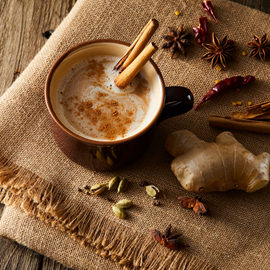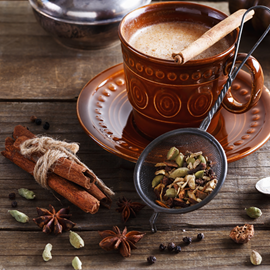I’m always looking for ways to make life delicious, health-giving and EASY! That’s why I adore this herbal chai tea recipe – 4 ways. Once you’ve nailed the basic chai, then you can switch it up depending what your health goal is and what herbs you’ve got on hand!
You’ll hear me say it heaps, but the beauty of home herbalism is that when we understand basic remedy-making, we get to add our own spin to the recipes. Hopefully yours won’t look exactly like mine, cause then you’ve created your *own* legacy for your home – and over time, your recipes will get lovingly passed from hand to hand, mug to mug amongst family and friends.
So how does this Herbal Chai Tea Recipe – 4 WAYS work?
There’s lots of ways to customise this, which I’ve noted below, but essentially you’ll make your chai tea the same way each time, by decocting your basic chai herbs. You can also add in different medicinal herbs depending what your health goal is. I’ve given you 4 versions in this post, but there’ll be others you could add as well.
Decocting is a tea-making technique where you gently simmer harder plant parts in water in a saucepan on the stove (learn the 3 tea techniques herbalists turn to and when to use each in my Mastering Herbal Teas in 5 Minutes a day course)
Underneath the recipe is a bit more info about each of the herbs and why I’ve chosen them for the Herbal Chai Tea recipe – 4 WAYS.
The Basic chai* recipe is:
- 3-4 cups water
- 1-2 cinnamon sticks, broken up
- 4-10 cardamom pods, (crushed with side of knife on chopping board or mortar and pestle)
- 1 inch slick fresh ginger, finely minced or grated
- 4-6 black peppercorns (crushed with side of knife or mortar and pestle)
- A few cloves, (crushed with side of knife or mortar and pestle)
- Dash of milk or plant mylk
Then add your other medicinal herbs:
- Deep IMMUNITY: 1 tablespoon astragalus root – DON’T use during active infection
- Glow Up: 1 tablespoon burdock root and 1 tablespoon dandelion root
- Burnout RESTORE: 1 tablespoon ashwagandha root (optional: add 1 tablespoon eleuthero root although this could be too stimulating depending on what your body needs)
- Caffeine-free chai: 1 tablespoon rooibos (if using, don’t add rooibos when simmering rest of herbs. Turn off heat and steep for 5 mins at the end)
To make:
- Chop or crush herbs you’re using. Most of these herbs are optional based on what you’ve got available and your taste preferences.
- Boil 3-4 cups water (in kettle or saucepan). Add water and herbs to saucepan. Bring to a boil, then reduce heat to a simmer and cover. Steep 30 minutes**.
- Strain tea into mug and add whatever milk you use^ sweetener too if desired.
- Because I usually decoct enough tea for the day, I’ll leave the remaining herbs and water steeping in saucepan, then gently reheat when I’m ready to drink my next cup. I find this flavour is fine, but then I’m used to strong teas. If you prefer, you can strain out all your herbs, compost them and store tea in fridge. Reheat as needed.
There are as many ways to make this, as there are people. Below are some ways to customise.

How to customise:
* Chai Herbs in this recipe: whilst these are pretty universal chai herbs, feel free to change it up according to what you’ve got, what you enjoy and what your health goals are.
Other herbs: aside from the variations already mentioned, you might also want to add: grated nutmeg, crushed star anise, fennel seeds, sliced vanilla bean, orange peel, rose petals, black tea, rooibos etc
** Time: I tend to decoct my chai for a fair while, if you don’t have much time or like a milder flavour – you can decoct for just 15 minutes.
^ Cooking in milk: I prefer to add milk to my mug once I’m done, but you can also add your milk to the pot when you’re done decocting your tea. You could also sub out half your water for milk (whatever type you drink) for a slightly creamier consistency
To lid or not to lid: I prefer to decoct my chai with the lid on. This traps the precious medicinal volatile oils in your drink. I also don’t see the need to reduce the liquid down as I want to drink several cups. You might see some other recipes however, reducing the liquid down by simmering without a lid on. If that works for you, you’re welcome to.
If you love learning tea recipes this way, you’ll LOVE my self-paced online course Mastering Herbal Teas in 5 Minutes a day.
I take you under the hood to learn so you can confidently blend your own teas – tailoring each brew to what herbs you’ve got, your health goals and your family’s tastebuds!
In this fun, easily-digestible course, you’ll understand the simple how’s and why’s of tea-making for digestion, mood, vitality and immunity so you can really take charge of your own health at home! Get it now!
Let’s take a quick look at what each herb contributes:
The chai spices are all warming carminative spices that improve digestion. They gently warm the gut and increase circulation there, helping ease common digestive symptoms such as bloating, cramping, gas etc. The more pungent chai spices, like ginger and pepper are great circulatory stimulations which warms you up and gets blood moving.
Deep Immunity: Astragalus is a preventative immune tonic, improving the overall health and function of your immune system. Great to use preventatively during winter or a great restorative herb to work with when you’re recovering from illness. Contraindicated (ie don’t work with) astragalus when you’re acutely sick with infection.
Glow Up: Burdock and Dandelion are great alterative herbs, gently supporting the body’s capacity to eliminate metabolic wastes through various channels which supports metabolic and liver health and creates a healthy skin glow. They both also support a healthy digestive system, which enhances our ability to absorb nutrients from the food we eat.
Burnout RESTORE: Ashwagandha is a superb remedy for depletion and burnout, particularly when accompanied by anxiety and stress-induced insomnia. When you’re wired but tired, her adaptogen properties will help with cortisol dysregulation, anxiolytic action soothes the nervous system and she helps reset circadian rhythm so you can get back into health sleep patterns.
Caffeine-Free: Rooibos is a lovely caffeine-free replacement for black tea in a chai tea recipe.
I’d love hearing how you go with this recipe – join the newsletter and hit reply and tell me how you go!
Also, let’s keep learning together! All my online courses and in-person Sunshine Coast workshops are designed to be practical, hands-on learning about herbs and remedies you’ll turn to again and again in daily life.
Make teas in Mastering Herbal Tea in 5 Minutes a day and in our DIY Remedy Kits where you’ll also learn other remedy-making techniques.


